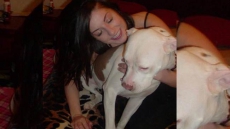A Canadian man who made international headlines for putting a shivering bison calf into his SUV at Yellowstone National Park was ordered on Thursday to refrain from picking up any other bison as part of his probation.
As part of a guilty plea to a wildlife disturbance citation, Shamash Kassam was also fined a total of $235 and ordered to donate $500 to the park's wildlife protection fund.
Documents from Wyoming district court show Kassam, of Brossard, Que., appeared via telephone for a hearing at which he pleaded guilty to the offence, after which the calf had to be put down.
Special conditions under his six months probation include that he "shall not pick up any more bison" and must pay the fines and make the donation by Oct. 31, 2016.
"The court has determined that the defendant does not have the ability to pay interest or penalties," the documents show.
On May 9, a patrolling officer, responding to a tip, found Kassam and his son near an area known as Buffalo Ranch.
Kassam told him they had spotted a "wet and shivering" baby bison in the middle of the road near a river. They waited for 20 minutes to see if any other bison would come back for the young animal, the officer said they told him.
"After 20 minutes they still could not see any bison anywhere in the vicinity, the bison calf would not leave their vehicle, appearing to be seeking warmth from the engine," the officer said in his criminal citation.
"Kassam stated he decided to pick up the bison calf or it would have been road kill, and drive to the Buffalo Ranch and call law enforcement."
The officer said the calf was in the trunk of the Toyota Sequoia.
He said he explained how the mother might not be able to find the youngster and Kassam apologized and said he had no intention to cause any harm.
Wildlife officers tried to release the calf back to a nearby herd but the reunification effort failed and the animal had to be euthanized because, according to the park, it was "causing a dangerous situation by continually approaching people and cars along the roadway."
Park regulations require visitors stay at least 23 metres from all wildlife — including bison, elk and deer — and at least 91 metres from bears and wolves.




